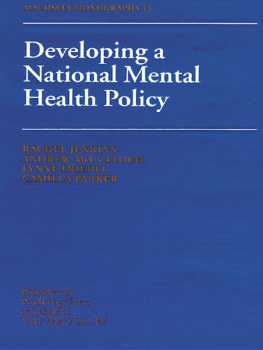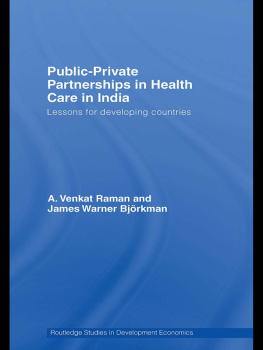
Health Care Systems in Developing Countries in Asia
For the last two decades, major Asian economies have successfully kept their economic growth momentum going. Now, as these economies are entering a new phase of economic growth, more attention is being paid to their respective states of social development, especially the provision and the expansion of social security and, in particular, health care. Academic study of the development of health care in developing countries has been for the most part neglected by the literature, and in-depth country case studies that are directly comparable on a one-to-one basis have not yet been conducted in a systematic manner. This book also proposes a new stance on health policy and the health care policy paradigm, one that focuses on saving lives from premature death, as well as illness, accidents, misery and poverty, based on the normative theory of developmental social policy (DSP).
This groundbreaking book will therefore serve as a valuable reference volume for health policy, social policy and public policy experts, social development experts, health and development economists, health sociologists, social workers, government administrators as well as other medical and health professionals and academics.
Christian Aspalter, Beijing Normal University-Hong Kong Baptist University United International College, China.
Kenny Teguh Pribadi, Catholic University of Soegijopranoto, Indonesia.
Robin Gauld, Pro-Vice-Chancellor Commerce and Dean, Otago Business School, New Zealand.
Social Welfare Around the World
Series editor: Bent Greve, Roskilde University, Denmark
This series publishes high-quality research monographs and edited books focusing on development, change in provision and/or delivery of welfare with a primary focus on developed welfare states. The books provide overviews of themes such as pensions, social services, unemployment or housing as well as in-depth analysis of change and impact on a micro level. The impact and influence of supranational institutions on welfare state developments are studied as are the methodologies used to analyze the ongoing transformations of welfare states.
1The Transformation of the Social Right to Healthcare
Evidence from England and Germany
Katharina Bhm
2Welfare State Transformation in the Yugoslav Successor States
From Social to Unequal
Marija Stambolieva
3Long-term Care for the Elderly in Europe
Development and Prospects
Edited by Bent Greve
4Health Care Systems in Developing Countries in Asia
Edited by Christian Aspalter, Kenny Teguh Pribadi and Robin Gauld
Health Care Systems in Developing Countries in Asia
Edited by Christian Aspalter, Kenny Teguh Pribadi and Robin Gauld
First published 2017
by Routledge
2 Park Square, Milton Park, Abingdon, Oxon OX14 4RN
and by Routledge
711 Third Avenue, New York, NY 10017
Routledge is an imprint of the Taylor & Francis Group, an informa business
2017 selection and editorial matter, Christian Aspalter, Kenny Teguh Pribadi, Robin Gauld; individual chapters, the contributors
The right of Christian Aspalter, Kenny Teguh Pribadi, Robin Gauld to be identified as the authors of the editorial material, and of the authors for their individual chapters, has been asserted in accordance with sections 77 and 78 of the Copyright, Designs and Patents Act 1988.
All rights reserved. No part of this book may be reprinted or reproduced or utilised in any form or by any electronic, mechanical, or other means, now known or hereafter invented, including photocopying and recording, or in any information storage or retrieval system, without permission in writing from the publishers.
Trademark notice: Product or corporate names may be trademarks or registered trademarks, and are used only for identification and explanation without intent to infringe.
British Library Cataloguing-in-Publication Data
A catalogue record for this book is available from the British Library
Library of Congress Cataloging-in-Publication Data
A catalog record for this book has been requested
ISBN: 978-1-4724-8341-6 (hbk)
ISBN: 978-1-315-58640-3 (ebk)
Typeset in Times New Roman
by Apex CoVantage, LLC
Contents
Part I
Introduction
ROBIN GAULD AND KENNY TEGUH PRIBADI
Part II
Theory
CHRISTIAN ASPALTER
Part III
Country case studies
WANG XIAOLIN AND SHANG XIAOYUAN
SIRIPEN SUPAKANKUNTI AND NOPPHOL WITVORAPONG
HEMATRAM YADAV
KENNY TEGUH PRIBADI
SHANKAR DAS
FRANCIS AMAGOH
Part IV
Conclusion
CHRISTIAN ASPALTER
Box
Tables
Figures
Appendices
Francis Amagoh, Professor in the Department of Public Administration and Director of the MPA program at KIMEP University.
Christian Aspalter, Professor of Social Policy, and Former Founding Head, Social Work and Social Administration Program, Division of Humanities and Social Sciences, Beijing Normal University-Hong Kong Baptist University United International College, Zhuhai, China.
Shankar Das, Professor (Chairperson), Centre for Health Policy Planning and Management, School of Health Systems Studies, TATA Institute of Social Sciences, India.
Robin Gauld, Pro-Vice-Chancellor of Commerce and Dean, Otago Business School; Co-Director, Centre for Health Systems and Technology, University of Otago, Dunedin, New Zealand.
Kenny Teguh Pribadi, Adjunct Faculty, Catholic University of Soegijopranoto, Semarang, Indonesia; Former Instructor, Applied Economics Program, Division of Business and Management, Beijing Normal University-Hong Kong Baptist University United International College, Zhuhai, China.
Siripen Supakankunti, Associate Professor of Economics and Director of the Centre for Health Economics, Faculty of Economics, Chulalongkorn University, Bangkok, Thailand.
Nopphol Witvorapong, Lecturer in Economics, Faculty of Economics, Chulalongkorn University, Bangkok, Thailand.
Wang Xiaolin, Professor of the Beijing Normal University; Research chief of International Poverty Reduction Center in China (IPRCC); Senior Human Development Specialist with poverty and inequality experience and strong strategic and networking skills, Beijing, China.
Shang Xiaoyuan, Associate Professor, Social Policy Research Centre (SPRC), University of New South Wales, Sydney, Australia.
Hematram Yadav, Professor in the Department of Community Medicine, MAHSA University, Malaysia.
Robin Gauld and Kenny Teguh Pribadi
Health care systems have become a topic of growing importance over the past couple of decades, especially so since the 2000 World Health Organization report (WHO, 2000). This report focused policy makers around the globe on different health care system functions and, particularly, on health care system performance for the fact that it ranked each member country. While there was no shortage of debate around how the rankings were done, and whether they were valid, the WHO report did bring attention to questions such as how equitable and efficient health care systems were and to the quality and accessibility of care delivered (Zelman et al., 2003; OECD, 2004; Ten Asbroek et al., 2004; Arah et al., 2006; Gauld et al., 2011). Since then, an international consensus has been building around what health care systems should aim for in terms of policy, structures and outcomes. This has been driven by not just the WHO but also other international agencies focused on health care, including the Organisation for Economic Co-operation and Development (OECD), think tanks, and a growing health care systems research community (OECD, 2004; Gauld, 2009; Leatherman et al., 2010).








